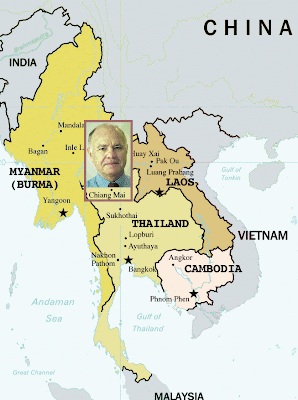Tuesday, December 23, 2008
Vengeance is mine
UPDATE
And Jim Kunstler, too.
Every little thing's gonna be all right
Perhaps it's no coincidence that BBC is currently screening a remake of Terry Nation's gripping 1975 post-catastrophe series, "Survivors". But that series assumes that most people have died suddenly because of a virus, so the ecosystem has not been destroyed by desparate, starving victims. I don't think Survivors is the model we should use. If we are to survive, it'll be together, in our populous societies, because if society breaks down, you and I are unlikely to emerge as the last people standing. Lone heroes don't win; this is a fantasy.
I think spare supplies are a good idea, because there could be some disruption, which could affect the very young and elderly; so we need ways to keep warm, eat and have clean water in an emergency. And it's important to make your home secure against a rise in burglary, which is associated with economic downturns; and not to go out after dark without at least one or two companions. Weapons are another matter: "guns in the home are far more likely to be used against members of the household than against intruders."
Pace the doomsters, the UK and the USA will feed itself. We may end up eating more veg and less meat; and we may be using public transport instead of cars; personally, that would simply take me back to the 70s, when I was slimmer and fitter. Globally and locally, there is enough to feed the world, although not enough to overfeed it or encourage unproductive men to sire children.
Two aspects of the current crisis worry me:
1. The present method of organising resources may be replaced, not by one dreamed of by well-fed Western socialists, but by a cruel, remote, commanding elite as in North Korea or East Germany, who far from minimising scarcity will use it to get and maintain power.
2. The transition from this system to whatever replaces it, may be disorderly and involve suffering for many people.
This is why I think the underlying issue for us is to preserve and strengthen democracy, to increase the chances that both the journey and the journey's end are acceptable.
Monday, December 22, 2008
Why banks?
Satyajit Das (htp: Jesse)
Nope. Banks need destroying, as does all this bank-created debt. The mistake is to try to keep things as they are. How did we come to buy houses "on tick", then cars, and now our clothes and groceries? Why is there any lending for consumption, seeing how it only means reduced future consumption? Why should banks be kept going, requiring a significant proportion of our earnings, so that wages have to be high for us to live on what's left, making us uncompetitive with the developing world?
I am reminded of the pitiless response of the Comte d'Argenson to the satirist, Desfontaines:
Desfontaines: I must live.
D'Argenson : I do not see the necessity.
Sunday, December 21, 2008
The lesser of two weevils
In an apocalyptic - but carefully-reasoned - post, Karl Denninger says that when the deficit expansion stops, US government spending will have to be cut by 50 - 60%, unless there is to be a "general default" on debts.
I have no idea what a general default would look like, but in a closely-interwoven and distant-from-nature modern industrial society I can only fear it might prove utterly destructive. So we're back to contemplating the lesser, but still vast disaster.
I also have no idea how much worse it might be in the UK.
Someone else please read this unberobed OT prophet and tell me where he's wrong.
PS
While the Obama Administration cannot take a 'weak dollar' policy it is the only practical way to correct the imbalances brought about by the last 20 years of systemic manipulation. It is either that, or the selective default on sovereign debt, most likely through conflict, a hot or cold war.
Saturday, December 20, 2008
Christmas viewing
How will the future look?
 Thanks to the glacial catchup by the mainstream media, the public is finally worrying about economic depression, and consoling itself with the thought that we've messed it up for everyone, so at least the Chinese won't prosper and come over here as tourists, overdressed, overpaid and taking too many pictures for their digital photoframes at home.
Thanks to the glacial catchup by the mainstream media, the public is finally worrying about economic depression, and consoling itself with the thought that we've messed it up for everyone, so at least the Chinese won't prosper and come over here as tourists, overdressed, overpaid and taking too many pictures for their digital photoframes at home. 
